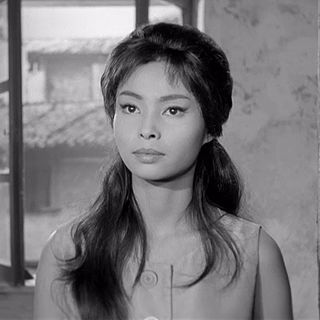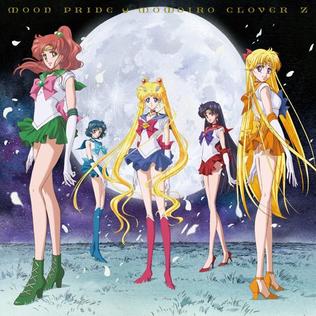Akiko Yano is a Japanese pop and jazz musician and singer born in Tokyo and raised in Aomori and later began her singing career in the mid-1970s. She has been called "one of the major musical talents of the Japanese popular music world", and her vocals and singing style have been compared to British singer Kate Bush.

All Purpose Cultural Cat Girl Nuku Nuku is a Japanese manga written and illustrated by Yuzo Takada. It was serialized in Weekly Manga Action for only three issues in 1991, with the three published stories later compiled in a single volume collection in December 1997. The story begins when genius inventor Kyusaku Natsume transplants the brain of a cat found by his son Ryunosuke on Christmas Eve, into a schoolgirl android that he created and subsequently stole from his former employer, Mishima Heavy Industries. The result, Nuku Nuku, is a nekomusume or cat girl. The manga was licensed by ADV Manga and published as a single volume on August 24, 2004.
Miu Sakamoto is a Japanese pop singer. She is the daughter of musicians Ryuichi Sakamoto and Akiko Yano.

Akiko Kojima is a Japanese model and beauty queen who was crowned Miss Universe 1959, making her the first Japanese and Asian woman to win the title.
Akiko Wada is a South Korean-born Japanese singer, tarento and businesswoman from Tennōji-ku, Osaka, Osaka Prefecture.

Akiko Wakabayashi is a retired Japanese actress.
Shizuka Kimura, known by her maiden name Shizuka Kudo, is a Japanese singer, pop idol and Actor born in Hamura, Tokyo, Japan. She was a member of Onyanko Club between May 1986 and September 1987 and went on to have a successful solo career with 11 number-one hits.

Wife to be Sacrificed (1974) is a Japanese soft-core pornographic S/M film starring Naomi Tani and directed by Masaru Konuma. The film was produced by Nikkatsu studios as part of their Roman Porno series.
Akiko Shikata is a Japanese singer-songwriter and composer, who is known for writing music for games and anime. She is best known for her contributions to the Ar tonelico, Shadow Hearts and Umineko no Naku Koro ni games, as well as anime adaptations of Umineko no Naku Koro ni, Akatsuki no Yona and Tales of Symphonia.
Akiko Higashimura is a Japanese manga artist from Kushima in Miyazaki Prefecture. She debuted in the now-defunct manga magazine Bouquet Deluxe in 1999 with Fruits Kōmori (フルーツコウモリ) and later gained notoriety for her manga Kisekae Yuka-chan, which debuted in Cookie magazine in 2001. Higashimura was nominated for the Manga Taishō in 2008 for Himawari: Kenichi Legend, in 2009 for Mama wa Tenparist, in 2010 for Princess Jellyfish, in 2011 for Omo ni Naitemasu, and in 2016 and 2017 for Tokyo Tarareba Girls. In 2010, she won the 34th Kodansha Manga Award for Best Shōjo Manga for Princess Jellyfish. In 2015, she won both the 8th Manga Taishō and the Grand Prize at the 19th Japan Media Arts Festival for Blank Canvas: My So-Called Artist's Journey. In 2019, she won the Eisner Award for Best U.S. Edition of International Material—Asia for Tokyo Tarareba Girls. Higashimura's younger brother, Takuma Morishige, is the author of the manga My Neighbor Seki.

Mark Crilley is an American comic creator, artist and children's book author and illustrator. He is the creator of Miki Falls and Brody's Ghost. He produces instructional videos on drawing on YouTube in various styles, including manga-styles. He was at one point an English teacher in Fukushima, Japan, as well as Changhua, Taiwan.
Akiko is a feminine Japanese given name.

Kokia Infinity Akiko: Balance is Kokia's ninth equal studio album, released simultaneously with Akiko Infinity Kokia: Balance in March 2009.

Akiko Infinity Kokia: Balance is Kokia's ninth equal studio album, released simultaneously with Kokia Infinity Akiko: Balance in March 2009.

"Karma" is a song by Kokia, released as her 20th single on April 22, 2009. It was used as the first opening theme song for the anime Phantom: Requiem for the Phantom, and would later feature in an edited version on the anime's soundtrack. Her song "Transparent" would be used as the second ending theme song for the same anime.
Professor Akiko Kobayashi is a Japanese chemist born in Tokyo. She is the designer and creator of Ni(tmdt)2, the world's first single-component molecular metal.

"Moon Pride" is the 12th single by the Japanese female idol group Momoiro Clover Z, released in Japan on July 30, 2014.

Tokyo Tarareba Girls is a Japanese josei manga series written and illustrated by Akiko Higashimura. It was serialized in Kodansha's Kiss magazine from March 2014 to April 2017 and later collected in nine bound volumes. It is licensed for an English-language release by Kodansha USA. The manga won the Eisner Award for Best U.S. Edition of International Material—Asia in 2019.
Rumania Montevideo is a Japanese pop band under the Giza Studio label. They were active from 1998 to 2002 and reformed in 2019. The band name comes from the combination of the Latin spelling of Romania and Montevideo, the capital of Uruguay.
This page is based on this
Wikipedia article Text is available under the
CC BY-SA 4.0 license; additional terms may apply.
Images, videos and audio are available under their respective licenses.









